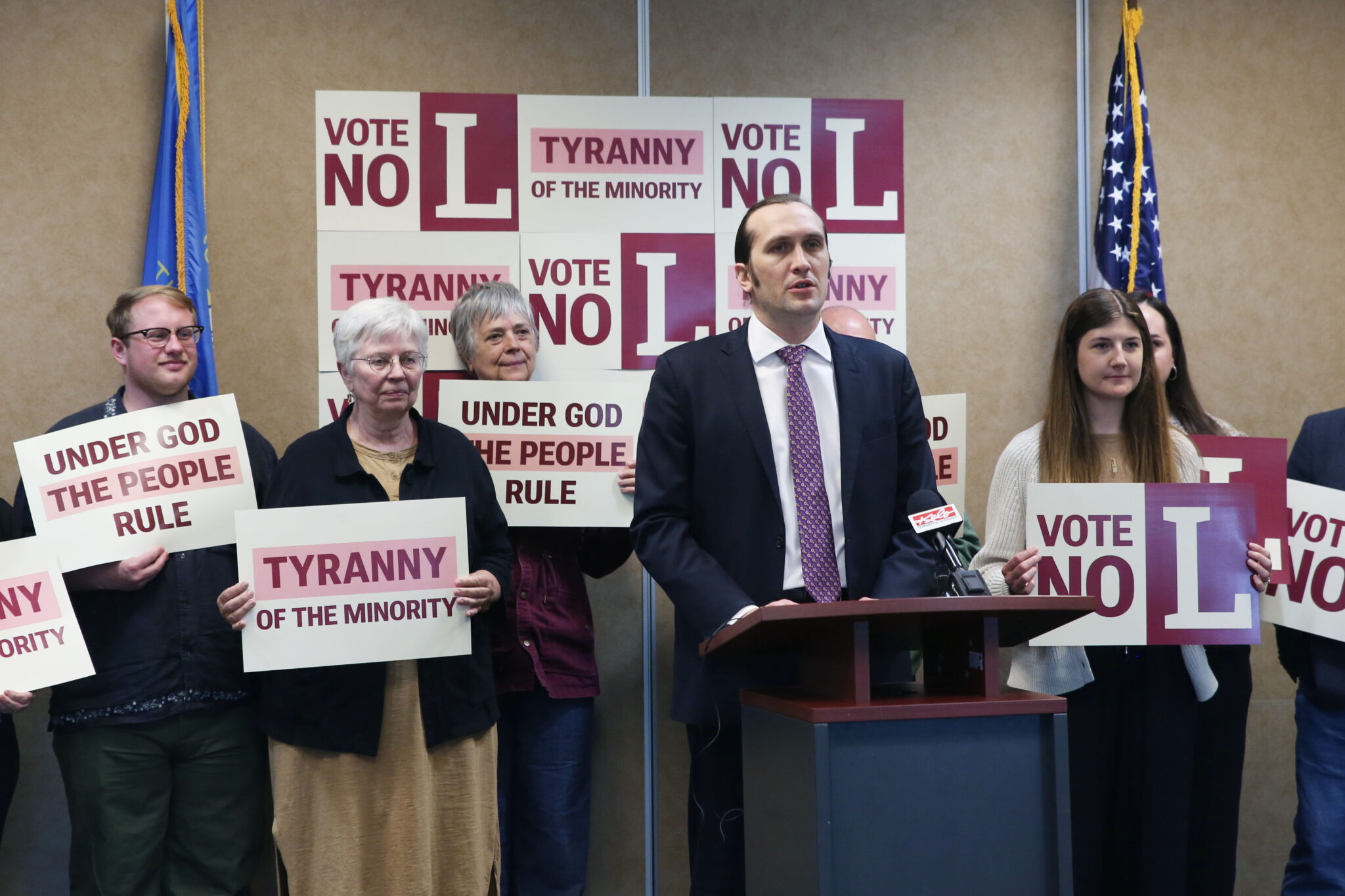
Makenzie Huber/South Dakota Searchlight
SIOUX FALLS — A constitutional amendment that South Dakota voters will consider in next year’s general election will strengthen rather than weaken the influence of out-of-state organizations in state politics, opponents of the amendment said Thursday.
Lawmakers approved a resolution this winter asking voters to increase the threshold for approving a constitutional amendment ballot measure from a simple majority to 60%. The question will be posed as Constitutional Amendment L.
Opponents launched a “No on L” campaign Thursday. Matthew Schweich, president of the Voter Defense Association, said the amendment would ensure the “tyranny of the minority” in the state.
Sioux Falls Republican Rep. John Hughes introduced the resolution. He told South Dakota Searchlight that the amendment would protect the state’s constitution from being amended by outside interests and prevent policy from being inserted into a document that’s intended only to stipulate the structure and powers of the government.
“Political issues shouldn’t be injected into the constitution,” Hughes said, adding “we’ve discovered it’s problematic and should be made more difficult.”

Hughes said an influx of constitutional amendments in recent years, including four last year (among seven total ballot questions), resulted in voter fatigue and groups bringing in “out-of-state money by the truckloads to convince people to do things ultimately against their best interests.” He specifically mentioned a 2022 amendment to expand Medicaid in the state, which passed with 56% of the vote, and a 2024 amendment to enshrine abortion rights in the state constitution, which failed with 61% of votes against it.
Amendment L wouldn’t change campaign finance laws to directly address out-of-state influence, Schweich said Thursday. Instead, he said, the amendment would make it more difficult for grassroots movements to succeed.
Schweich has worked on several ballot measure campaigns in recent years, most recently on a failed measure to legalize recreational marijuana in the state.
“If Amendment L takes effect and constitutional amendments require 60%, the only people who will be able to attempt them are big money, out-of-state groups, because they will have the resources to run all of the ads necessary to hit 60%,” Schweich said.
Similar measures in 2018 and 2022 proposing to increase the voter threshold for constitutional amendments failed at the ballot box.
Passing constitutional amendments is already difficult, Schweich said. South Dakotans have passed nearly half of the 100 constitutional amendments placed on the ballot since 1972, when South Dakotans gained the right to initiate them, according to a report from the No on L campaign.
If Amendment L were to have taken effect in 1972, only 20% of amendments would have crossed the 60% threshold since then, according to the report.
That includes several amendments related to gambling in the state and 2012’s Amendment O, which requires a balanced state budget each legislative session. The law passed with a 57% vote.
The 60% threshold would also have prevented Medicaid expansion, Hughes said, which currently has South Dakota on the hook for an “unfunded mandate” to cover millions of dollars of costs if the federal government reduces its share of Medicaid expansion funding.
“It’s a constitutional train wreck,” Hughes said. “The people who are pushing this agenda are unhappy with the views of a majority of South Dakotans, so they’re trying to manipulate people to change our culture and our core values.”
Supporters of the resolution during the legislative session included representatives with the National Rifle Association, South Dakota Right to Life, Protecting South Dakota Kids, South Dakota Retailers Association and South Dakota Family Voice Action.
Lawmakers endorsed three more constitutional amendments this winter that will be on next year’s ballot, including a clarification that non-U.S. citizens can’t vote in South Dakota elections, the creation of an unclaimed property trust fund, and a question to allow the Legislature to remove South Dakota from expanded Medicaid if the federal funding share declines.
Another six potential ballot questions from the public are already listed on the Secretary of State’s website. Two of those questions have been approved for petition circulation.
